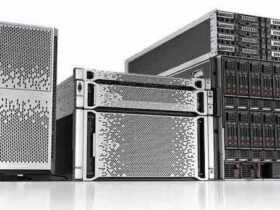When you start looking for a web hosting plan for your site, you are faced with a range of options like Shared Hosting, VPS Hosting, Cloud Hosting, Dedicated Server Hosting, etc. Of these, Cloud Web Hosting has evolved as the preferred hosting service due to its reliability, resource scalability, and other benefits. While traditionally, most web servers used Hard Disk Drives or HDDs, in recent years, Solid State Drives or SSDs have helped boost the performance and reliability of the webserver. In this article, we will talk about an SSD Cloud Hosting service and how it is different from normal Cloud Hosting.
In the Cloud Hosting setup, your site is stored on a web server that is shared between multiple users; however, the site data is stored across multiple servers. The site’s data is replicated across this network, allowing the host to offer instant resource scalability, better reliability, and uptimes.
What Is SSD Cloud Hosting?
Traditionally, web servers used Hard Disk Drives. In SSD Cloud Hosting, the webservers are based on a Solid State Drive. Among other benefits, this allows Cloud Hosting providers to offer faster processing speeds and more reliability to hosted websites.
Benefits of SSD Cloud Hosting over Normal Cloud Hosting
In normal Cloud Hosting, the Cloud Host uses a Hard Disk Drive. Hence, we will compare SSD Cloud Hosting with HDD Cloud Hosting.
1. Better Site Performance
Websites using SSD Cloud Hosting load faster than those using normal Cloud Hosting. This is because HDDs have slower read and write speeds than SSDs. Hence, an SSD-based server processes the requests faster. Also, an HDD has a considerable time lag between consecutive requests. This is not the issue with SSDs. Hence, SSD Cloud Hosting offers better site performance.
2. SSD-based Servers are more reliable
A drive stores data and helps the server retrieve it as needed. HDDs and SSDs have different mechanisms for storing and retrieving data. HDDs have a rotating metallic disc and a moving arm to store and retrieve data. This physical movement makes them prone to wear and tear. Hence, the server could suddenly crash if the hard disk faces damage. SSDs, on the other hand, don’t have any moving parts. Data is stored and retrieved on an SSD-based Cloud Hosting Server via chips. Hence, there is no wear and tear due to physical movement. This makes SSD Cloud Hosting Servers more reliable than normal servers.
3. Lower consumption of power
HDDs, with a rotating disk and moving arm, require a certain amount of power to stay functional. SSDs, on the other hand, require lesser power since they use integrated chips and no moving parts. This makes SSD Cloud Hosting more power-efficient than normal Cloud Hosting servers.
4. SSD Cloud Hosting is costlier than normal Cloud Hosting
HDDs are cheaper than SSDs. Therefore, normal Cloud Hosting plans are cheaper than SSD Cloud Hosting plans. However, the benefits offered by SSD-based servers easily outweigh the extra costs.
Summing Up
Since their launch, SSDs have increased in popularity across industries. Web hosting companies have identified the benefits they can offer to hosting plans and have started offering SSD Cloud Hosting plans to site owners. As you can see, SSD-based servers offer better performance and reliability to websites. However, they are costlier than normal plans. Hence, it is important to assess your site’s hosting requirements before upgrading to Cloud Hosting and buying an SSD Cloud Hosting plan. Look for the best Cloud Hosting provider and choose a plan after considering all aspects carefully.
The following video helps you with things to consider when upgrading to Cloud Hosting:







